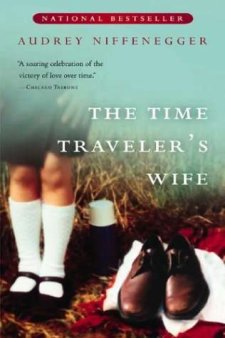The Time Traveler’s Wife isn’t the kind of book I normally read. It’s a bestseller (an “international bestseller” according to the cover of my edition), a romance, and it’s SF written by someone who doesn’t read SF and doesn’t know SF-writing protocols. I read it because people I knew really liked it, and because libraries exist to let people try books with no strings. I got my own copy because I knew I’d want to read it again. It’s a strange book, but really powerful.
All good time-travel stories have the satisfaction of a clever sudoku or sliding block puzzle. This belongs with The Anubis Gates and Dirk Gently’s Holistic Detective Agency in those terms. But the book it most resembles is Ken Grimwood’s Replay with its small scale personal focus.
There’s this otherwise ordinary guy called Henry who time travels in the way other people have epilepsy. Under stress, he finds himself elsewhere, usually visiting parts of his own past, but occasionally the future. He just turns up there, naked, visible, and very vulnerable. The novel is about his life, out of order (though the time travel makes you question the very concept of “order”) and the impact his life has on that of his future wife, Clare, who he first meets when he is thirty-five and she’s six.
In Knight Moves, the scientific team sent to study the teleporting animals dismiss the idea that teleportation could be chemical, because there just isn’t enough energy. It was strange to turn from that to Niffenegger’s handwave that not only teleporting but time-travel could be chemical, biological, and genetic. You just have to face that it’s silly and get on with it. (There are silly things in SF too.)
What Niffenegger does is make me buy it emotionally by showing me up close the effects it has. She isn’t interested in the handwaved details, she’s interested on the effect it has on people’s lives, on Clare and Henry and their friends. There are weird ethical issues—Henry spends a lot of time with Clare as a child and shapes her character, and when she meets him in real time she is already in love with him, though he isn’t quite the man she knows, yet, either. There’s also the fact that Henry always shows up naked. This means he needs to open locks, steal clothes, food, and shelter, and behave in ways that people normally wouldn’t. He runs every day because he needs to be in shape to outrun his problems in the past and the future.
Henry doesn’t behave like a character in a science fiction novel. He’s kind of a jerk, and he wants to lead a normal life. He has no fantasies of political agency. The things fans would do with his abilities don’t occur to him. He goes to see concerts of bands that have broken up and visits himself as a child, his wife as a child. He copes well with the fact that he can’t really change anything, but the things he tries to change are all small personal things. He does win money in the lottery, but he keeps on working in a library—where his habit of running around naked in the stacks attracts some attention. He neither keeps his time traveling a secret nor holds a press conference—he tells his friends and family, he gets a doctor trying to work on a genetic cure, he tells his co-workers when he has to, and he tells Clare the second he meets her, when she’s six.
I’ve been talking about Henry, because he’s easier to talk about than Clare, although the book is titled for her and she’s just as important. Clare grows up with a list of dates when she’s going to meet Henry. She knows from the time she’s twelve that she’ll marry him one day. She never knows what age he’ll be when he turns up behind her house, though she knows he’ll need clothes, and keeps a stash of them for him. She does not, and the text is very clear about this, grow up like an ordinary person. Henry’s time travelling has more of an effect on her than it does on him. They both have to cope with it, and that’s what makes this such a good book.
The end made me cry quite a lot, both times I’ve read it. I can see how some people find it emotionally manipulative, but if it’s pushing buttons it pushed mine quite successfully.










